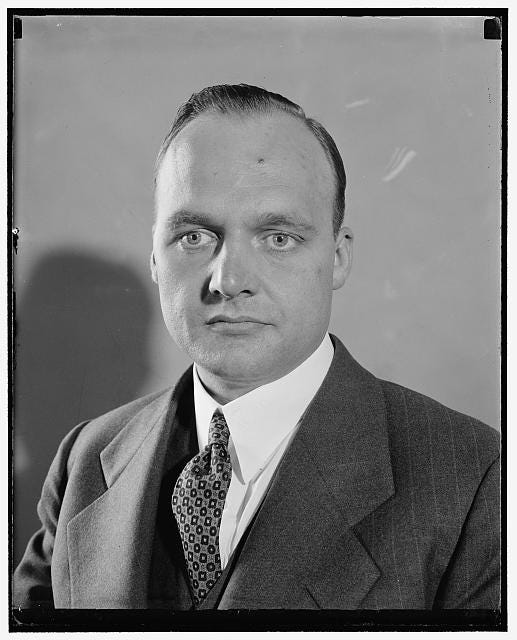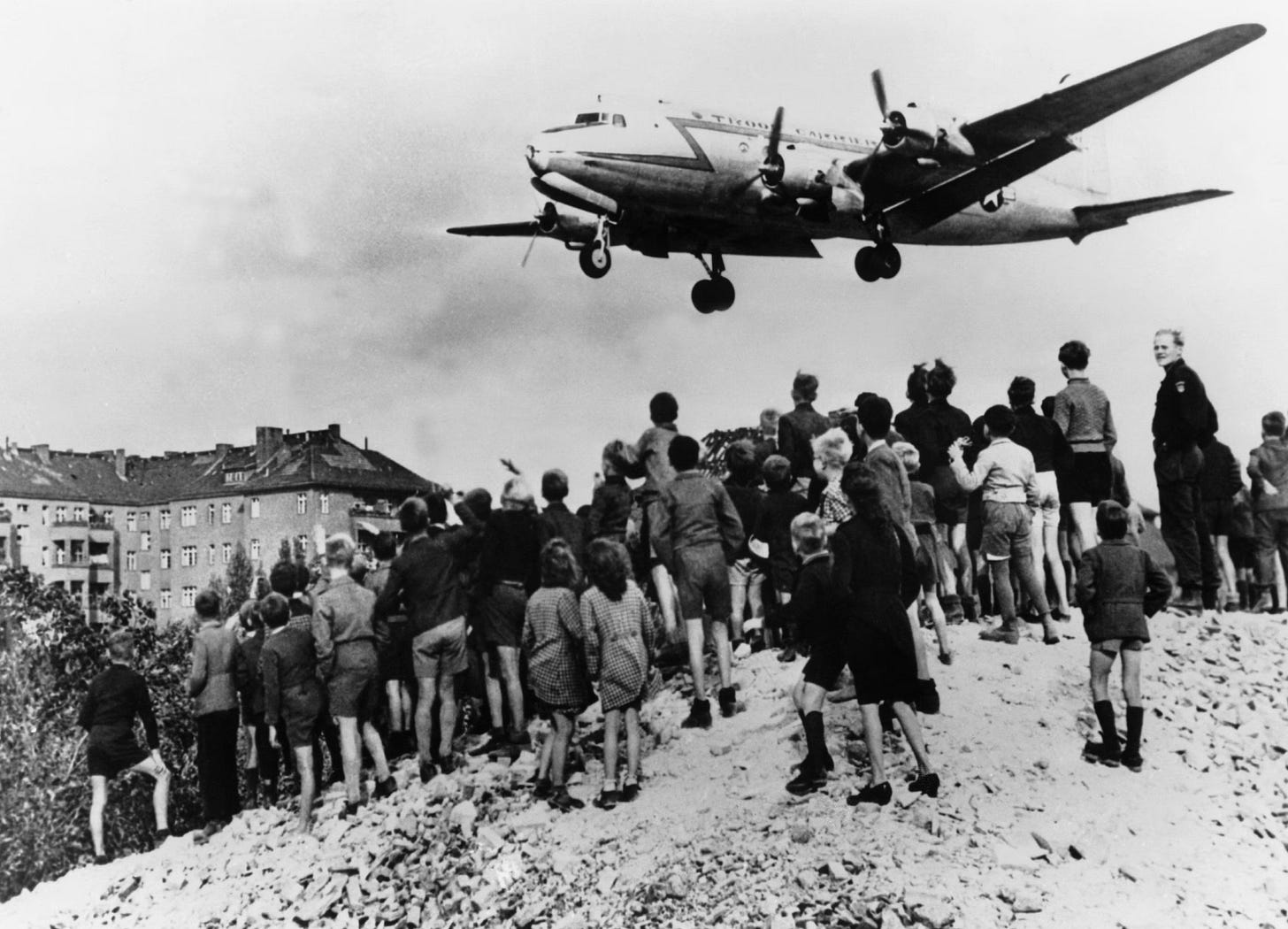Title: Hope and Possibility [de: Hoffnung und Möglichkeit]
Author: G. v. A.
“Der Weg” Issue: Year 02, Issue 11 (November 1948)
Page(s): 813-817
Dan Rouse’s Note(s):
Der Weg - El Sendero is a German and Spanish language magazine published by Dürer-Verlag in Buenos-Aires, Argentina by Germans with connections to the defeated Third Reich.
Der Weg ran monthly issues from 1947 to 1957, with official sanction from Juan Perón’s Government until his overthrow in September 1955.
Source Document(s):
[LINK] Scans of 1948 Der Weg Issues (archive.org)
Hope and Possibility
By G. v. A.
These days mark the 300th anniversary of the Peace of Westphalia, and it is worth taking a look at the current situation in Europe and the world today. The deep despondency and brokenness of European cultural consciousness existed then as it does now. Three hundred years ago, Europe and the cultural world of that time had learned to allow opposing views, Catholic and Protestant, to coexist and live rightfully. This realization was one of the most decisive for the conclusion of peace. From its recognition, the value-creating spirits drew new faith and confidence, believing in a new development. And not without reason! One of the most powerful and creative periods of European culture emerged: Classicism with Goethe, to name only its most significant representative, and the music of Bach, Beethoven, Haydn, Mozart, and Schubert.
In comparison with today, we do not come off very well. After a war epoch that has also lasted over 30 years, there are still no signs of reconciliation with mutual tolerance. Indeed, more than ever, there is a readiness to violate every view in favor of one’s own. This applies to the political world of ideas in communism as well as in democracy, where in the latter, many resounding words are used to veil the facts. True tolerance and genuine humanism are pushed aside as superfluous appendages. Although in name, any uniformity is rejected, Central Europe, with Germany, must allow itself to be condemned because of its purely external uniformity—where the external appeared only half as much because it stood in inverse proportion to the inner conception and way of thinking of the Germans.
Today, intellectual uniformity in the pros and cons of democracy and communism, and the leveling and massification of intellectual, human, and culturally value-creating life, is more apparent than at any other time. Even National Socialism, which initially knew how to rise above the emerging leveling and massification and later succumbed to it in its leadership strata, never exerted such a homogenizing and leveling influence. And here already lay a reason why history did not allow the work of these men to succeed. The reality, which lay in the reversal of Goebbels’ words:
“If we do not win, world history has lost its meaning,”
proves the supratemporal meaning of history, as did the bitter criticism of Rosenberg in his closing statement at Nuremberg:
“Many thousands of the best National Socialists imagined National Socialism differently from how it was presented to them, without having decisive influence to fundamentally change things.”
The process of massification of an inherently pure will had also set in there and, with a leadership principle that certainly did not always let the clearest intellectual and political forces decide, which often still bore the complete stamp of human weakness, had to fail in the end.
One could almost believe that this process of intellectual and human leveling cannot be stopped anymore. One need only look at the “so-called World Congress of Intellectuals in Breslau,” where the politically violated world found its expression in mutual accusations of the intelligence of politics. From a world-historical perspective, it is almost ironic when precisely the former US Deputy Attorney General John Rogge states,
“No state and no political party has the right to dictate to people what they should think.”
Anyone who has experienced the question of so-called re-education according to the democratic model in Germany and Central Europe must naturally and justifiably doubt the political sincerity of both the West and the East. Precisely the occupation policy of a Clay-Morgenthau with their control and re-education officers, with their democratically prescribed press and news organs, which are directed exclusively according to military and political viewpoints, prove the opposite.
Anyone who sees Europe as a unity free from petty nationalist thoughts, in which the peoples, despite their different races and ways of thinking, despite their different languages and differentiations, represent a living diversity, a European family of peoples forced to live together for better or worse, where the advantage or harm of one nation in the long run affects that of the others, will, precisely from intellectual and cultural insight, affirm not only the possibility but the necessity of political and economic cooperation, indeed, fervently advocate it due to the shrinking of this continent through technical development and through the interplay of the new power factors America and Asia, geopolitically and politically. Europe’s tragedy is not only its diversity but also the influence of extra-European forces, which applied to Turks and Mongols as it does today to Americans and Asian Bolshevism. Today’s European statesmen and politicians are increasingly recognizing this.
The intellectual structure of Europe can only proceed under the formula of live and let live. Economists, who more readily recognize the obvious in such matters, act accordingly. No one recognizes this more clearly than the representative of the Marshall Plan, Paul Hoffmann, who, for economic reasons, is determined under all circumstances to break with the senseless and mindless, economic and political nonsense of dismantlement. And under the same formula, the political sense of the German working class is shown not only in the Berlin demonstration against the collective coercion of Bolshevism, for which the Western view is quick to praise, but also in the sit-in strike at the Mannesmann-Röhrenwerke in Düsseldorf against the dismantlement nonsense, in which stubborn English stupidity and one-sided mercantile spirit, as it is not only occasionally found across the Channel, go hand in hand.
“Each state has its own domestic and foreign policy; economy, taxes, and customs jointly,”
says the assassinated Count Bernadotte in his proposal to the UN on the future state form of the Holy Land regarding Jews and Arabs. The same formula can not only, but must be applied to European conditions. With all consideration of one’s own kind, it is not the against but the with each other that is decisive.
What would the world say today if Bernadotte’s proposal had amounted to an expulsion of Arabs or Jews? It would probably have been dismissed as the proposal of someone not accountable. This “wisdom’s final conclusion” was reserved for the incompetent statecraft of a Stalin, Truman, and Churchill-Attlee in Potsdam, who expelled and disenfranchised 15 million people, and the statesmanlike wisdom of the responsible occupation governments today only suffices to shunt them from one too-narrow space of an artificially created little country to another, in the quiet hope that this question will resolve itself, probably through the dying out of these 15 million. This avalanche unleashed in Potsdam will reverberate in the coming centuries and fall back primarily on the originators and those responsible.
How far this policy of destroying Europe’s ethnic dam against Asia is already having an effect is evident from the fact that the USA, and at a distance and in dependence on it, England—France completely drops out due to its political powerlessness—cannot leave the protective wall to the Germans on the Vistula but must now take it over themselves, relocated further back to the Elbe. The struggle for Berlin, which today occupies and excites world public opinion, is little more than a struggle for an advanced, encircled bastion, which is hopeless, and where the inner consciousness of the Berliners still contributes more strongly than the much-praised and still insufficient food supply by “Skymaster.”
How much English shortsighted political obfuscation in the European sense lies in Baldwin’s words “England’s border lies on the Rhine”? The error is too obvious to enter into a discussion about it. Here, it is not the statesman who judges, only the English petty bourgeois guided by small domestic interests, who did not know that England also lies in Europe. No, England’s border never lay on the Rhine, but in this sense always on the Vistula!
The rebuilding and rebirth of Europe can only lie in the voluntariness of the Europeans, thanks to their intellectual strength and attitude.








